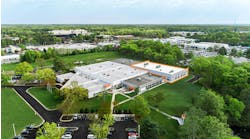The worldwide market for general motion control (GMC) systems is expected to grow at a compounded annual growth rate (CAGR) of roughly 7% over the next five years, according to a new ARC Advisory Group (www.arcweb.com) study.
The report explains that the market for GMC systems is being driven by new growth taking place in the developing regions of Asia. An expansion, driven in part by a shift of the semiconductor industry, has occurred from industrialized high-wage economies to areas where production costs are far cheaper. In addition, new technologies have made older-style machines obsolete as new form factors have presented a clear value proposition to upgrade. "Modular drive and motor components have enabled a step change in machine design allowing OEMs to improve on traditional designs in myriad ways," says Analyst Stefan Surpitski, principal author of ARC's "General Motion Control Worldwide Outlook. "This technology has afforded machine builders a great deal more flexibility in design."
Expansion of the Semiconductor Industry
The semiconductor industry, in particular, did very well with a capital expenditure growth rate of more than 11%. GMC systems are a core element in the machinery used to produce semiconductor components. The GMC systems sold in the semiconductor market require and are equipped with higher precision and far greater dynamic performance. A large majority of applications in this sector require custom-engineered solutions, which contribute to the higher value of these solutions. The higher rate of growth in this market, when compared to the other industry segments, is attributed to both an increase in volume and sales of higher value systems.
Multiple Technologies Converge
The role of individual packaging machines is broadening as businesses adjust to the real-time market pull. This requires machinery to be a flexible resource on the factory floor with a greater purpose in maximizing utilization throughout its lifetime. This flexibility simply creates a greater operational range, which has led OEM machine builders toward solutions that combine automation technology from a wide range of domains. Specifically, packaging lines and individual machines continue to witness the convergence of robotics, general motion control technology, and vision integrated with machinery, making it easier to commission, configure, and adapt to the day-to-day variation in production requirements. Packaging machine solutions that are adaptable to a wider range of manufactured products are increasingly incorporating the latest GMC and robotic capabilities.



